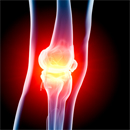
There are currently hundreds of different forms of arthritis, with osteoarthritis as the most common one, often involving the knees, back, and hands. Other forms of arthritis include rheumatoid arthritis and psoriatic arthritis.
Wood Implants, Joint Health and Pain
The most common complaint associated with arthritis is pain. Arthritis pain can be quite excruciating because it involves the joints, which are usually swollen. Joint stiffness may also prevent a person from performing simple tasks such as going up the stairs and even walking. To some people with arthritis, the pain can be constantly unbearable that is causes them to develop depression, especially when their movements and activities are curtailed.
Several medications are currently available for the treatment of symptoms associated with arthritis. Anti-inflammatory drugs such as naproxen and ibuprofen may lessen the inflammation of joints and reduce joint stiffness, whereas supplements such as glucosamine and chondroitin sulfate may help improve joint health. There are also herbal supplements that could reduce the pain caused by the inflammation of joints.
Severe Arthritis and Joint Help
Severe cases of arthritis sometimes result in replacement of a specific joint in order to help a person move again. These people often experience extreme pain and joint stiffness, in which taking simple anti-inflammatory drugs do not result in any relief anymore. Joint replacement has been associated with the use of metal or plastic structures that were designed to replace joints and bones that have deteriorated through time. These effected joints are actually the ones that cause pain in individuals. However, these artificial joints have also resulted in some degree of pain after surgery.
Wood Implants – Gaining Momentum?
Researchers are now looking into the effectiveness of using other biomaterials in replacing joints and knees. An Italian research group has examined the used of silicon carbide mixed with titanium in producing a biomaterial that provides strength to a specific part of the body such as the knee or hip. In addition, the use of these materials should also produce minimal response in the body, including that of allergic reactions to foreign materials detected by the immune system.
Why Wood Implants Could Be Beneficial
According to the researchers, silicon carbide is similar to wood because it provides the tensile strength of material, which may help improve an individual during movement. In addition, these biomaterials can resist tearing, especially when they are expected to be involved in constant movement of the body. Most importantly, the researchers observed that the use of these biomaterials still supported the growth of cells in that specific part of the body, thus allowing a person to improve joint health.
RELATED READING: 332% More Powerful Than Glucosamine?
The researchers also performed comparisons between this new biomaterial and plastic artificial joints. The results of their study showed that both types of joints were associated with the growth of cells within days. However, the use of silicon carbide was strongly associated with a lower number of immune reactions to that observed in artificial joints made of metal. The researchers thus suggested that this wooden type of implant might be more beneficial for patients who would want to improve their joint health and reduce the pain that they experience with arthritis.
Improvements for Joint Health/strong>
Based on the improvements in biomaterials around the world, it would not be surprising to hear more promising designs for artificial joints and bones. The advancements in material science may generate lighter and stronger materials that could replace defective joints in the body. These new designs may also be considered as helpful solutions for the millions of people struggling with the discomfort brought about by arthritis.